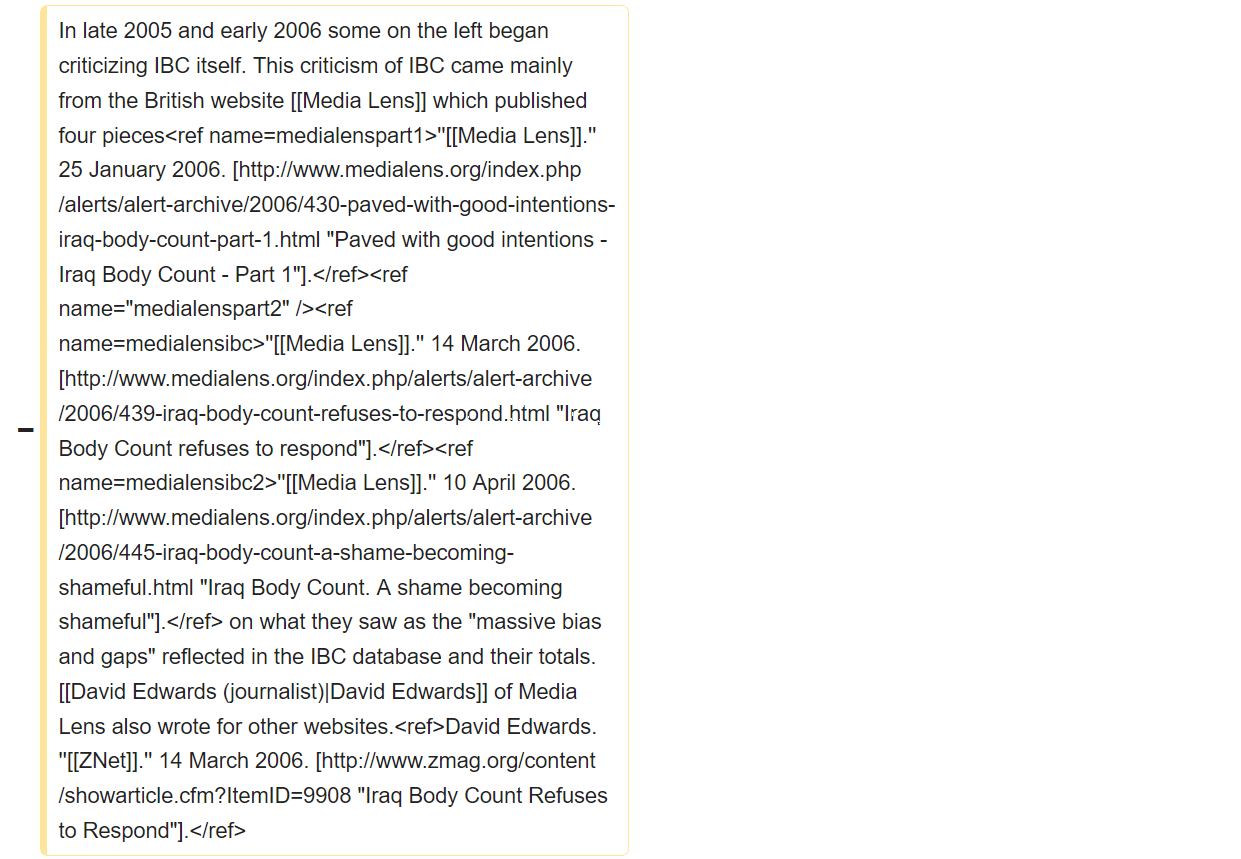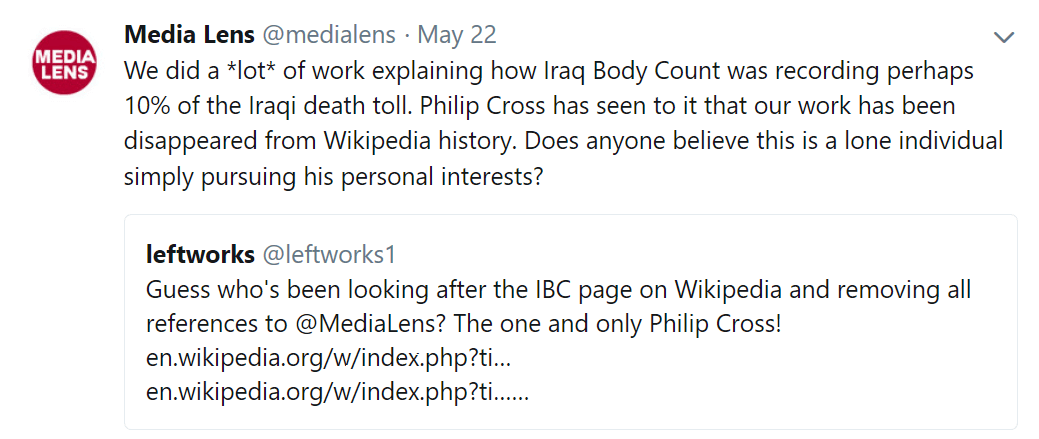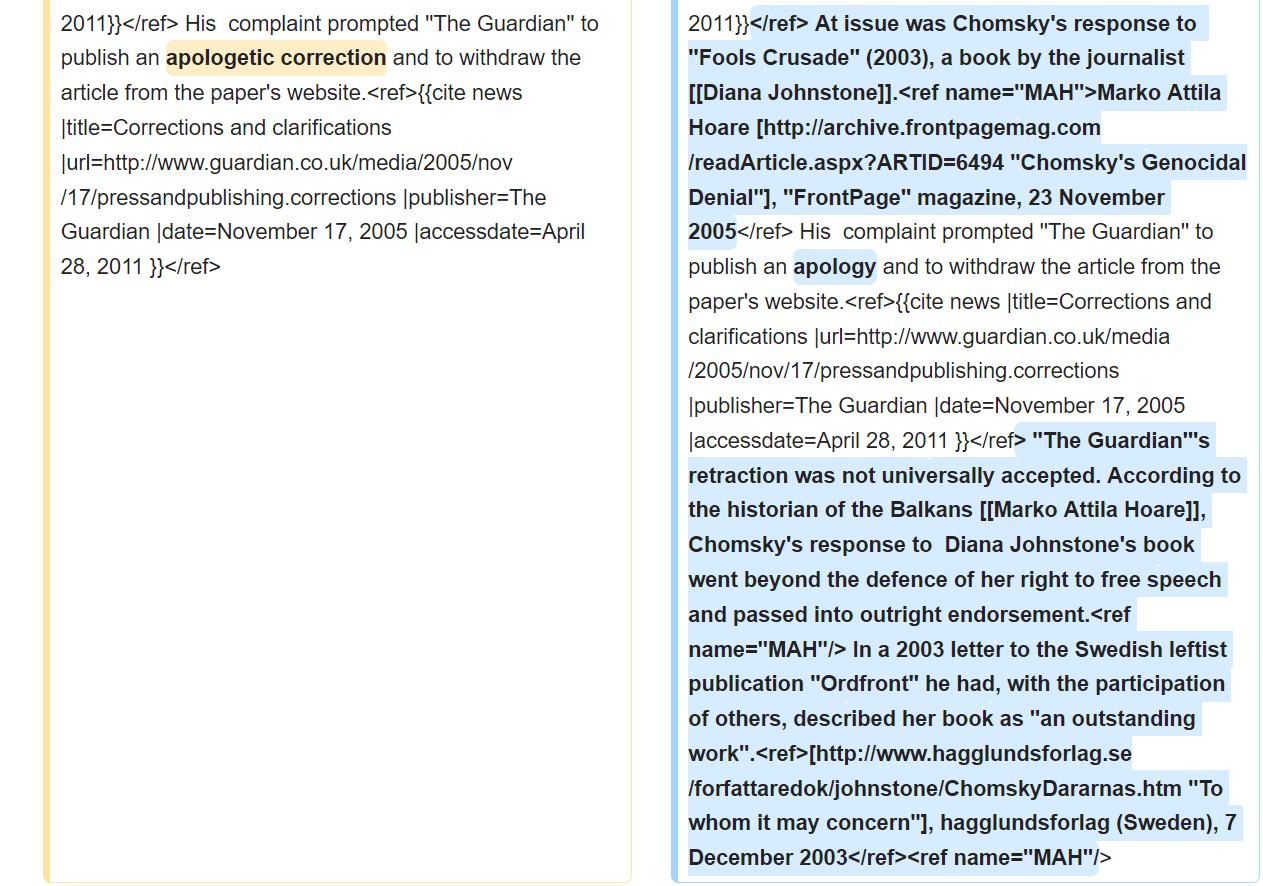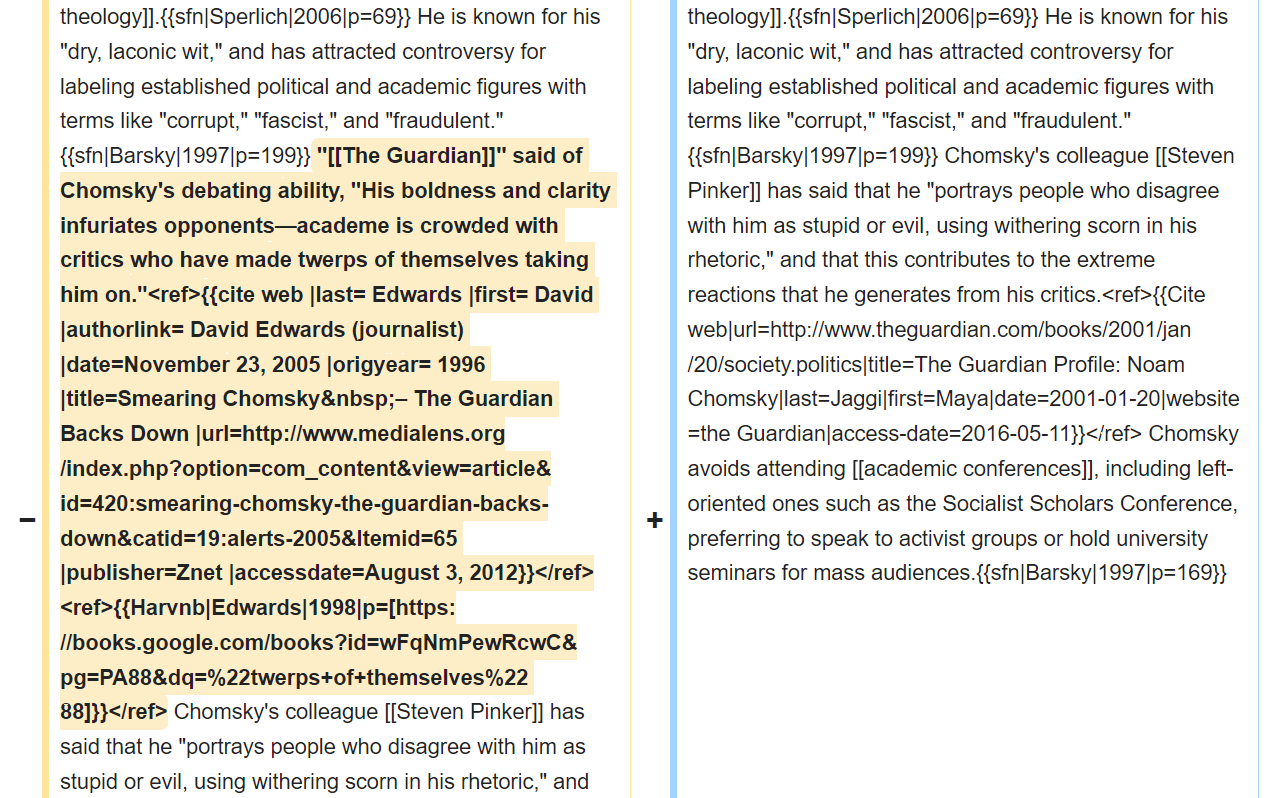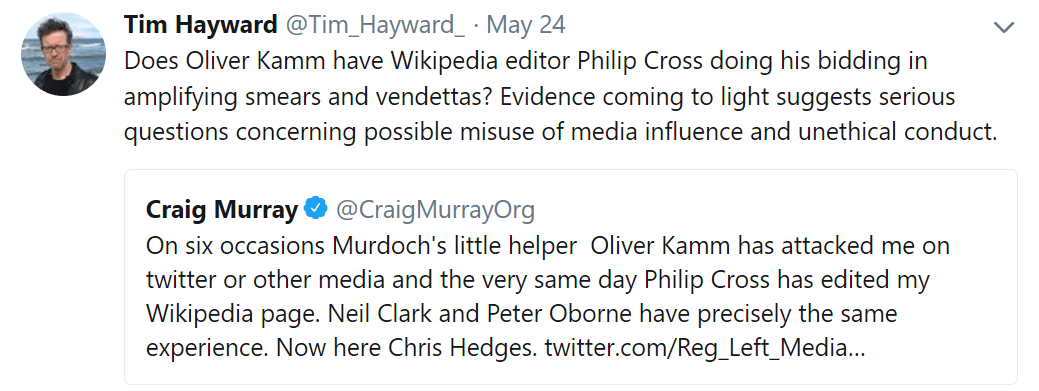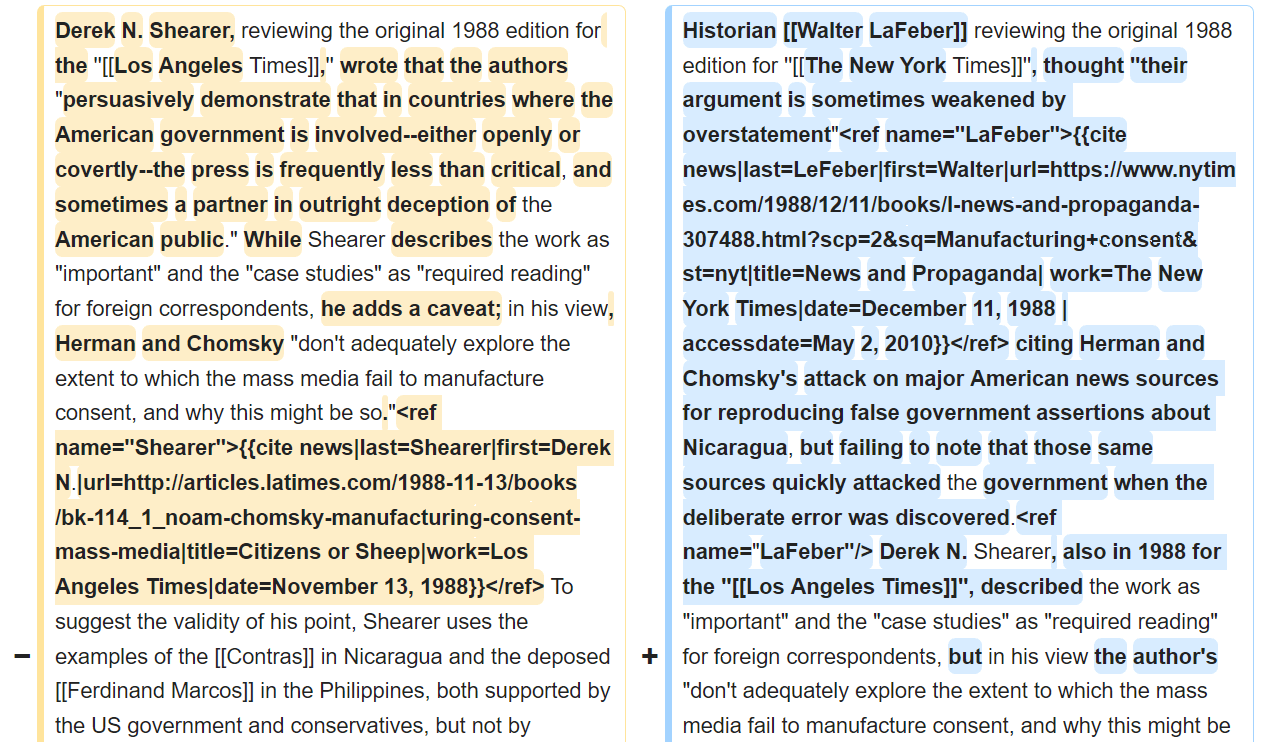Update: The agenda-driven edits of Philip Cross and Wikipedia's response
26 May 2018 (updated 21 June 2018)
We have published two more pieces on this story
- 17 May 2018 — Time to ditch Wikipedia? A look at a Wikipedia editor's long-running campaign to discredit anti-war campaigners and journalists
- 20 June 2018 — Philip Cross: More Evidence
If you haven't been following the story, the first link above is a good place to start. But very briefly: Wikipedia editor Philip Cross has been active on the site for almost 15 years. He edits the Wikipedia pages of anti-war voices, who he dislikes, to remove positive information and include negatives points of view. He is openly hostile to many of them on Twitter.


Many people have been digging up more and more egregious edits to Wikipedia pages made by Philip Cross. We want to highlight some of these here for those who have not been following developments closely on Twitter.
Viewing edits in isolation, however, doesn't always explain the significance of the edits. Knowing the context and looking at the double standards involved should give readers a better idea of the clear bias at play.
Media Lens vs. Iraq Body Count
The Iraq Body Count (IBC) project maintains, according to their website, the "largest public database of violent civilian deaths since the 2003 invasion". It is controversial because many consider it to seriously under-report the deaths resulting from the war. Media Lens were probably the most vocal about this issue in 2006 and 2007. In one of their alerts they wrote:
IBC is also important because its figures for civilian deaths in Iraq have been used by the British and American governments, and by the media, to attack or dismiss higher estimates in other studies.
For those who did not follow Media Lens' challenges to IBC, the story was big enough at the time that it was even covered by the BBC. For anyone looking into the work of Iraq Body Count, Media Lens' work should feature prominently, and for many years it did.
In 2016, however, in a number of edits, Philip Cross decided to remove all references to Media Lens' work from the Iraq Body Count Wikipedia page:
His reason? "non-notable blog, rm [remove] citations to website edited by 2 men". Let's not forget that this "non-notable blog" has an entry on Wikipedia which Cross dominates. It is his second most edited entry on the site, and almost 80% of the content is from Cross himself. Cross started editing the Media Lens Wikipedia entry in 2011. Cross has called Media Lens 'goons' on Twitter.
Cross knows this is disingenuous. If Media Lens are "non-notable", why do they have a Wikipedia page? And why is that page Cross' second most edited page on Wikipedia?
At time of writing, there is still no mention of Media Lens on the Iraq Body Count Wikipedia page.
Neil Clark
Anti-war writer Neil Clark has written for The Guardian, The New Statesman, The Times, and other publications. His review of a book by Iraq war supporter and former hedge-fund manager Oliver Kamm in 2006 led Kamm to embark on a campaign of harassment and defamation, according to Clark. Kamm boasted on his blog in 2008:
I can reasonably claim to have done more than anyone in destroying Clark's career as a political commentator... I am not a commentator whose work will last, but I'm effective in my own way.
Needless to say Philip Cross soon takes up the cause. (As we'll see later, the Cross-Kamm connection is rather sinister.)

Cross is warned in 2008 to stop editing Neil Clark's page by Wikipedia administrator Guy:
I'd ask you please if you would leave his article alone now.... to avoid further distress to an article subject.
Undeterred, Cross edits again less than two weeks later, to the astonishment of the admin:
And after that you still edited it again on 2 April?
Neil Clark describes what happened next:
After I had complained to senior wikipedia editors over the repeated malicious editing of my page by an editor called ‘Philip Cross ... Kamm popped up on the discussion page to argue for the page’s deletion on the grounds that I was ‘non-notable’. Yet despite his haughty dismissal of me as a ‘highly obscure figure’, Kamm never explained why, if that was indeed the case, he devoted so much time attacking me. In an article chronicling Kamm’s obsessive Internet smear campaigns entitled ‘The Oliver Kamm School of Falsification’ the US writers David Peterson and Edward Herman wrote “A glance at a number of (Neil) Clark's writings online shows that Kamm seeks out websites where Clark's writings appear, and then posts the same allegations against Clark over and over again, no matter how off-topic these allegations are“.
I’m not the only person to have been pursued by Kamm in such a creepy way. Peterson and Hermann have documented Kamm‘s ‘pathologically obsessive’ attacks on the US anti-war academic Noam Chomsky. “One feature of the Kamm pathology is the vendetta, and in pursuit of his vendettas, Kamm displays few constraints”, they added.
With Clark's page gone from Wikipedia, Cross turns his attention to references to Clark on other Wikipedia pages. In 2012 he removes two links to Clark's writing published by the Guardian and the New Statesman about the author Erich Fromm:
His reason? "reduced link farm". These were the only two links to articles published by mainstream news sources listed in the 'External links' section of the page.
Noam Chomsky
Noam Chomsky is a philosopher, linguist, and political activist. He's described by the New York Times as "arguably the most important intellectual alive today".
In 2013 Cross edits Noam Chomsky's Wikipedia page to add a link to a piece attacking Chomsky published in FrontPage magazine, a far-right, Islamophobic publication (according to Wikipedia itself).
In 2016 Cross edits Chomsky's Wikipedia page again to remove all references to Media Lens, who write positively of Chomsky:
Reason given? "obscure book by obscure writer".
Chomsky has said of Media Lens:
Regular critical analysis of the media, filling crucial gaps and correcting the distortions of ideological prisms, has never been more important. Media Lens has performed a major public service by carrying out this task with energy, insight, and care.
Oliver Kamm–Philip Cross synchronicity
For many, the attacks on anti-war voices made by Iraq war supporter and former hedge-fund manager Oliver Kamm, and then the subsequent edits on Wikipedia to their pages by Philip Cross has not gone unnoticed.
What's interesting about many of Cross' edits is not just that they target the same people Kamm happens to dislike, but also how well they time up with Kamm's tweets. The pattern here tends to be that Kamm will tweet something about someone he disagrees with, and shortly afterwards, Cross edits that person's Wikipedia page. See a list being maintained of edits where this pattern has been detected.
Confirmed names Oliver Kamm has tweeted about on the same day Philip Cross has edited their page:
Chris Hedges, Max Mosley, Mark Wadsworth, Peter Oborne, LabourLeave, David Ward, Ken Loach, Nick Timothy, Alex Salmond, Nafeez Ahmed, Owen Jones, Diane Abbott, Tim Hayward, Piers Robinson, Craig Murray, Alex Nunns, Glenn Greenwald, Media Lens, "Douma Chemical Attack", Robert Fisk (edited a day before, not the same day), George Galloway, Jeremy Corbyn, Media Lens, Seumas Milne, Edward S. Herman, Paul Flynn, Afshin Rattansi, Mo Ansar, John Pilger.
If you would like to add to this list, please contact either @_jrvansant or @Reg_Left_Media.
Edward S. Herman
Media critic and analyst Edward Herman was co-author along with Noam Chomsky of the seminal book Manufacturing Consent: The Political Economy of the Mass Media. He died 11 November 2017. The book was mostly the work of Herman, according to Chomsky.
On 14 November 2017, the section about the book on Herman's Wikipedia page starts off with a positive quote from Derek Shearer's review in the Los Angeles Times. Herman and Chomsky, Shearer writes:
persuasively demonstrate that in countries where the American government is involved—either openly or covertly—the press is frequently less than critical, and sometimes a partner in outright deception of the American public.
The section then ends with some mild criticism of the book from a New York Times review.
Unhappy with this reflection of the book, Cross decides to switch these reviews around:
Twitter user @leftworks1 comments:
not only does Cross reverse the reviews so that the more critical is on top, he reverses Shearer's review so that the more critical comment is on top.
Wikipedia response
Wikipedia admin Guy starts the discussion on Wikipedia's Administrators' noticeboard:
There's a lot of noise about Philip Cross (PC) on the internet, with implausible claims of COI [conflict of interest] and such
Notice that Guy considers the claims 'implausible' already. Notice also that this is the same administrator who warned Cross in 2008 to stop editing the page of Neil Clark, as we pointed out earlier. That call went unheeded.
Another Wikipedia editor writes:
...I didn't look in the details, assumed Guy's summation was reasonable. But having read in more depth here, I agree there's a clear problem.
Guy's next act, having not had things go his way, is to try and punish a Wikipedia editor who had the temerity to supply some actual evidence of Cross' conflict of interest from Twitter, along with past examples of Wikipedia editors expressing concern about Cross. Guy writes:
Regardless of the merits of anything else here, I think KalHolmann should be topic banned from any further mention of user:Philip Cross, other than in the context of any potential ArbCom [arbitration committee] case. He is not helping.
At this point, many Wikipedia admins and editors appear to be sensing an agenda from Guy himself:
The proposal is bizarre - I see no evidence of disruption, merely the odd mistake any of us might make
Needless to say, Guy's proposal to ban the helpful editor does not go through.
A lot of discussion ensues, but with no sign of matters reaching a resolution. Out of nowhere, Guy jumps back in to the discussion announcing that he has started an arbitration request. The statement put forward by Guy, focuses only on Cross' dispute with George Galloway (mentioning 'Galloway' 12 times), and not the other anti-war voices who have been targeted by Cross, nor any of the egregious edits made by Cross. Guy's aim appears to be to make this out to be a dispute between one "long-standing and prolific editor" and a "divisive and marginal figure with more enemies than friends".
We'd like to take this opportunity to point out Guy's own colourful past on Wikipedia. In 2006 he put himself forward for Wikipedia's Arbitration Committee. After an outpouring of opposition from other Wikipedia editors, he withdrew. Some comments opposing his election:
Just in the last few weeks, he's engaged in personal attacks ("idiot","idiot"), incivility ("f_ck off", "f_ck off"), biting a new user ("pissing me off"), and revealing the identity of an anonymous user (here, then again here after the user removed it to preserve his identity). I don't care what the other editors did, should an admin and arb com candidate be calling someone an idiot and telling them to f_ck off?
Can't trust him to act neutrally, sorry.
Being an arbitrator requires more patience than JzG has shown in the diffs above.
Doesn't assume enough good faith.
Personal attacks and consistent advocacy for banned vandal prove inaptitude for the job.
it is his support for a troll who came with death threats, attacks and harrassment way beyond the point of no return which is of concern to me
Identify of Philip Cross
Many people have speculated as to the identity of Philip Cross. According to George Galloway, Cross is a "real and vulnerable person".
Our concern in highlighting all this has less to do with Cross' identify, and more to do with highlighting the ease with which a person or group can edit Wikipedia pages to paint others in a favourable or unfavourable light, and remove valuable information.
Philip Cross continues to edit the pages of people he is in conflict with.
Don't trust what you read on Wikipedia!
Please spread the word to anyone who's unaware of the extent to which Wikipedia can be manipulated in this way.
Email a friend - Share on Facebook - Tweet about it
And if you'd like to see some action taken by Wikipedia, please tweet Jimmy Wales and let him know.
More information
Follow leftworks, RLM, Malone for more insights and examples of Cross' editing—they have done great work examining edit histories and the proximity of edits to Kamm's tweets.
Follow Cross' targets: Craig Murray, Neil Clark, George Galloway, Media Lens, Tim Hayward, Piers Robinson
Listen to George Galloway and Neil Clark discuss the matter on Talk Radio
The Oliver Kamm School of Falsification: Imperial Truth-Enforcement, British Branch
The Philip Cross scandal: How Wikipedia is being used against left-wing journalists
Craig Murray: The Philip Cross Affair
Contact
If you'd like to get in touch about anything here, please email [email protected] or tweet us @fivefilters.
Article updates
- Published 26 May 2018
- Updated 28 May 2018
- Updated 21 June 2018
